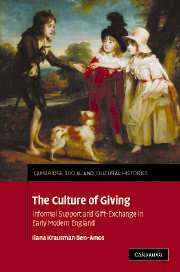Conclusion
Published online by Cambridge University Press: 04 May 2010
Summary
Gift giving offers the historian a potent perspective on a wide range of social interactions as well as the role played by the circulation of goods in the formation and sustenance of social bonding and ties. Our study, which focused on a set of practices in an early modern context, pointed to the vigour with which these practices were sustained over the entire period. Varied forms of giving and support did not wither or decline under the impact of the Reformation and the pressures of expanding state and market activity – as had sometimes been assumed – but rather proliferated, diversified and thrived. Gift giving and support were essential to parent–child interaction and familial configurations, and they abounded within networks of kin, neighbours and associates in the rural countryside as well as amidst urban environments and associations. In parishes across the country, diverse and eclectic forms of collections and alms offering were maintained alongside the gradually implemented system of public relief based on the compulsory rates. Endowments and testamentary bequests were sustained, as were varied benevolences and repeated acts of almsgiving during an individual's lifetime – within churches and households, in guildhalls and during fairs, in alehouses and streets, or in the new cultural spaces of fast-growing towns. Varied forms of aid and support – from ‘strategic’ support offered at critical life-cycle junctures to more casual but still vital support in the form of services, favours and gifts, information, contacts, material aid and sociability – are to be observed, permeating multi-faceted networks that formed the interface of expanding urban environments including trade and economic activity as well as leisure and associations that promoted varied interests and designs.
- Type
- Chapter
- Information
- The Culture of GivingInformal Support and Gift-Exchange in Early Modern England, pp. 376 - 389Publisher: Cambridge University PressPrint publication year: 2008

